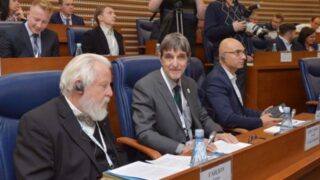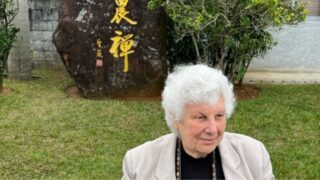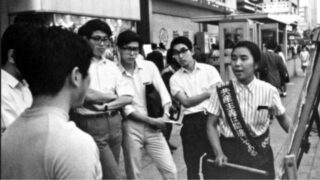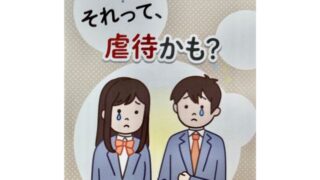Toru Goto was kidnapped to be deprogrammed and confined for twelve years and five months. His story is important to understand the Family Federation case.
by Makiko Takita
Article 5 of 6. Read article 1, article 2, article 3, and article 4.


An interview with Toru Goto
Representative of the National Association of Victims of Abduction, Confinement, and Forced Conversion. Born in Yamagata Prefecture in 1963, Toru Goto graduated from the College of Science and Engineering, Nihon University. His answers were compiled by the magazine.
“I was confined for twelve years and five months from September 11, 1995, to February 10, 2006. There were several places of confinement, but the longest was in a room on the eighth floor of an apartment building, a five-minute walk from JR Ogikubo Station in Suginami Ward, Tokyo, where people and cars were constantly passing by. My parents, my brother and his wife, and my sister abducted me and imprisoned me. The reason my confinement continued for such a long period was that I was a member of the Family Federation for World Peace and Unification (formerly known as the Unification Church). The purpose was to compel me to leave the church. However, my confinement was not carried out by my family alone. Behind the scenes, there were some ex-members who specialized in ‘persuading’ Unification Church members to leave the church, and under their supervision, human rights violations were carried out with impunity.”
“In March 1986, my brother, who was four years older than me, joined the Unification Church after being approached on the street. My brother invited me to join the church, and my sister joined as well. My brother was determined to devote his life to the faith, but in the spring of the following year, my father took him away. My father, who was walking with him near our home, signaled, ‘That’s him!’ and a group of strange men attacked my brother from the shadows. My brother was forced into a car and locked in a room of an apartment in Kobe for about a month, and after he was deprogrammed, he left the Unification Church.
He later said that his uncle, who is a Christian, advised him to leave the Unification Church. After my brother left the church, he was invited by Mr. M, who was the key figure among the deprogrammers, to stay at a Christian church in Tokyo. Mr. M. is the person who deprogrammed my brother in an apartment in Kobe. My brother began to regret bringing my sister and me into the church, and he began to think about how to ‘rescue’ other followers.”
“In October of the same year, my father called me and asked if I wanted to meet him. At the meeting place, my father said, ‘Your brother is waiting for you where you are going,’ so I followed him to a luxury hotel. I almost cried when I saw my brother again after a long time. He said, ‘Long time no see. How have you been?’ Then, with a mysterious look on his face, he said, ‘I have decided to quit the Unification Church. I want you to listen to what I have to say.’ I looked at the entrance to the room and saw that the door had been secured so that it could not be opened from the inside. I felt my blood boil. Then Mr. M, the man who had forced my brother to leave the church under confinement, appeared. Mr. M, who had brought along former believers whom he had deprogrammed, bad-mouthed the church for a long time.”
“I was so angry at being tricked and locked up that I started screaming in the bathroom, ‘Get me out of here!’ But they dragged me out and started a scuffle, helped by my father and brother, and they seized me. After a few days, the situation had not changed at all, and I decided to falsely pretend that I was leaving the church. I was released from the hotel when I said, ‘I have found out that the Unification Church is wrong.’ But this time, I was moved to a small apartment in Tokyo. There were food and toilet facilities, but other than that, my parents and brother were always watching me, and there was no way to escape. There was no telephone or television. I was completely cut off from the outside world and was not even allowed to go outside. The only time I could go outside was when I was taken to a worship service or study group at the Christian church my brother attended. I decided to pretend that I had left the Unification Church and to wait for an opportunity to escape. One month later, in late November, when everyone closed their eyes during prayer at a service, I took advantage of the moment to escape and succeeded.”


“Eight years had passed since the first abduction and confinement. My father promised me that he would never do anything like that again. After some time, I started to visit my family again. I just got engaged, and my brother married a former believer who had also left the church. My sister had also left the church. I believed that there would be no more kidnapping and confinement. However, I was wrong.”
“It was September 11, 1995. When I returned home for the first time in a while, my father said, ‘Toru, I need to talk to you.’ The friendly atmosphere changed drastically, and he said, ‘As a family member, I just can’t leave Toru alone. Let’s go somewhere else.’ As the back-and-forth with the family continued, my brother and sister-in-law said, ‘Let’s go.’ Then my brother and father held both sides of me. Surrounded by my family on all sides, men I had never seen before appeared, and I was forcibly taken away in a car and once again imprisoned in an apartment. All the windows were fitted with security locks called wind-locks, which could not be opened from the inside. I can say that I was completely cut off from the outside world. ‘You told me you wouldn’t do this anymore,’ My father looked a little apologetic and said, ‘Yes, I did.’ He then said, ‘This is the only way. I’m sure you’ll understand eventually.’”
“My brother, on the other hand, said, ‘This is not kidnapping and confinement. It’s protection.’ And he said, ‘Well… don’t worry so much, you will not die.’ I returned to the life of being watched by my family. From time to time, a Christian pastor would bring a former member of the Unification Church. He would visit my room three days a week at most, and repeatedly criticize the doctrine and the founder of the church, forcing me to repeat statements of apostasy for one to two hours. It sounds impossible to be deprogrammed and confined by a pastor, but it was clear that they would not let me out of there even if I rebelled.”
“After much deliberation, I decided to pretend I was leaving the church. I told them that I had made a mistake and that I was going to apostatize. But my confinement did not end at all. One day, after one year and nine months of confinement, my brother informed me that my father had passed away. He asked me to come to Tokyo to say my final goodbyes. I was surrounded by these strange men while I was in front of my father’s corpse. Five minutes later, my brother said, ‘Let’s go.’ I was surrounded again and put in a car. This time, I was moved to another apartment in Tokyo, where my brother told me that he would not allow me to attend the funeral. No explanation was given as to why.”
“The next room assigned to me was a six-mat room at the far end of the room, farthest from the entrance. There was a curtain in front of the entrance, so I could not see the entrance directly. Seeing a slight opening, I flipped back the curtain to reveal a dial-lock key, indicating that the confinement was ongoing. The sash door to the balcony was closed, and since we were on the sixth floor, escaping through the window was impossible. My brother went to work during the day, but my mother, sister, and brother-in-law remained in the apartment to keep an eye on me.
I felt frustrated when I thought about my fiancée, who was probably worried about me. Six months of idleness in the one-room, six-mat apartment followed. In December 1997, my sister suddenly announced that she was going to move me to a new apartment, and I was moved to another place, always surrounded by strange men.”


“When I entered the new apartment, there was a three-meter-long corridor in front of me. When you opened the door at the end of the hall, there was a six-mat Western-style room, a four-and-a-half-mat Western-style room, a kitchen, a six-mat Japanese-style room, and a series of rooms in a straight L-shape. The innermost six-mat Japanese-style room was where I was confined. Here, Mr. M appeared again with an ex-believer. It had been 11 years since my first confinement. The former believer said to me, ‘You coward! You ran away that time!’ He suddenly hysterically shouted at me. Mr. M said, ‘I heard that you just pretended you left the church. Don’t you feel the shame of deceiving your pastor and family?’ ‘You have no right to claim human rights. Besides, I didn’t lock you up. Your family is protecting you. If you want to be let out, ask your family. Use your head. You’re an idiot,’ ‘You’re a fool,’… About my late father, Mr. M once said to me, ‘You killed him’ and ‘What are you going to do about it?’ repeatedly insulting me. I was so indignant at his insensitivity that I said, ‘If you say I killed him, why don’t you just turn me into the police right now? Take me away!’ I once shouted.”
“Mr. M is also said to have been deeply involved in the deprogramming of Hiroko Yamazaki, a rhythmic gymnastics instructor who was abducted and confined in 1993. He has deprogrammed many believers and was involved in deprogramming my brother and sister and in my two abductions and confinements. He has been working with a pastor of a Christian church and has received requests from several parents of former members of the Unification Church to deprogram their children, who are believers. While managing an advertising agency, Mr. M organized a group of parents and others and taught them how he may ‘persuade’ their children to leave the church by abduction and confinement. Parents who would accept his proposal would abduct their children and lock them up in a room in an apartment building near the church with the help of other parents whose sons and daughters had been deprogrammed before. Such a system was established, and Mr. M was at the center of it.”


“A forced conversion through abduction and confinement is called deprogramming. In the U.S., it was recognized as a violation of human rights, and its illegality was established so it was no longer practiced. In Japan, however, it continued until 2005, when I won a lawsuit against Mr. M in court. Abduction and confinement were carried out under the supervision of family members. Even if the police got involved, they did not intervene because they regarded it as a family matter, and so far, nobody has been punished for this crime in Japan. At the trial, Mr. M denied abduction and confinement and claimed that he only went there to discuss the matter after hearing that the person in question consented to it.”
“Idle time passed. I didn’t even know where I was. One day, the voice of an election car running by saying, ‘Hello, Ogikubo 3-chome residents,’ made me grasp where I was for the first time. Even in prison, the inmates have the freedom to walk around, but that was not granted to me. There were times when I tried to force my way through, but each time my brother caught me and pushed me back. When we struggled, my muscles were atrophied, and I was easily knocked down and slammed to the floor. Then Mr. M appeared and said, ‘What on earth are you doing! Don’t make a fuss, or else!’ he threatened. Fierce physical fights often ensued. I once used the bathroom vent to call for help. I could faintly hear people talking through the vent. Perhaps conversations in the bathrooms of people living in apartments on the floor below leaked through the vents. I put my mouth over the vent and said, ‘Can anyone hear me? I’m locked up in here! Call the police!’ I shouted again and again.”
“As I was yelling over and over, Mr. M appeared and grabbed me by the collar. He pulled me out of the room, looked at me coldly, and said, ‘This guy is no good.’ He muttered to himself and left the room. The flu was raging, and I and several of my family members had come down with it. I was bedridden with a fever of nearly 40 degrees Celsius, but I was not allowed to see a doctor. I once decided to go on a hunger strike to protest my desperate situation. My mother said anxiously, ‘You can’t do that, don’t do that.’ My sister insisted, ‘You don’t want mom to make your food? You sure?’ My brother and sister-in-law looked at me with dismay and said, ‘Mom, let’s just leave him alone. He said he wouldn’t eat it.’ At mealtime, I had to sit in the fetal position holding my knees, and watch my family eat. During my fast, my brother and sister-in-law said to me, ‘You still don’t listen to anybody at all. You should think for yourself.’ I said, ‘What are you talking about? This is the ugliest violation of human rights ever!’ Then she said, ‘Human rights, human rights… there are no human rights for a rotten person!’ My brother and sister-in-law often got furious as we talked. Sometimes she sat on her knees in front of me and slapped my face, sometimes she became hysterical and shouted, ‘Wake up!’ and then would pour ice water from the kitchen down my back. The shivering cold was hard on my weakened body, but the mental misery was unbearable. I gave up the hunger strike after three weeks. I did the hunger strike twice after that when I saw the opportunity.”









